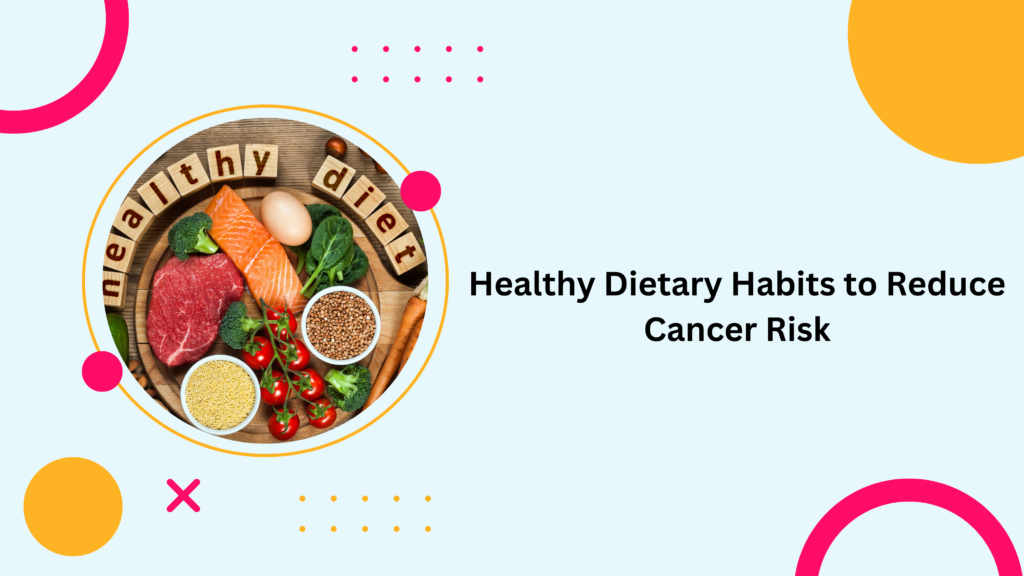
Healthy Dietary Habits to Reduce Cancer Risk
In today’s fast-paced world, maintaining good health is of utmost importance. We all strive for
longevity and vitality, and one of the key ways to achieve this is by adopting healthy dietary habits.
Research has shown that our daily food choices can significantly impact our risk of developing cancer.
In this article, we will delve into the world of nutrition, exploring the dietary choices and habits that
can help you reduce the risk of cancer. So, let’s get started with a comprehensive guide that can
potentially change your life
Introduction
Cancer is a complex disease, influenced by various factors such as genetics, environment, and
lifestyle. While we cannot change our genetics, we do have control over our lifestyle choices,
especially when it comes to what we eat. Research has shown that certain dietary habits can play a
significant role in reducing the risk of cancer. In this article, we will explore these habits in detail.
The Power of a Balanced Diet
A balanced diet is the foundation of good health. It provides our bodies with the essential nutrients
needed for optimal functioning. Let’s delve into some key components of a balanced diet that can
reduce your cancer risk.
The Role of Fruits and Vegetables
Fruits and vegetables are packed with antioxidants, vitamins, and fiber. These nutrients help combat
free radicals and reduce inflammation, both of which are linked to cancer development. Make sure
to include a colorful variety in your daily meals.
Whole Grains for Sustained Energy
Whole grains like brown rice and quinoa provide sustained energy and are rich in fiber. Fiber aids
digestion and may lower the risk of colorectal cancer. Make whole grains a part of your daily diet.
Lean Proteins for Muscle Health
Opt for lean sources of protein such as poultry and fish. They contain essential amino acids that
support overall bodily functions. Limit the consumption of red and processed meats, which are
associated with an increased risk of cancer.
The Importance of Hydration
Staying hydrated is crucial for overall health and can reduce cancer risk. Drinking plenty of water
helps flush toxins from the body and maintains healthy cell function. Carry a water bottle with you to
ensure you meet your daily hydration needs.
Limiting Processed and Sugary Foods
Processed foods and sugary beverages often contain additives and excess sugar, contributing to
inflammation and weight gain. Both factors are associated with a higher cancer risk. Opt for whole,
unprocessed foods instead.
The Role of Portion Control
Eating in moderation is vital for maintaining a healthy weight, closely linked to cancer prevention.
Overeating can lead to obesity, a risk factor for various cancers. Pay attention to portion sizes and
listen to your body’s hunger cues.
The Importance of Meal Timing
Meal timing may also play a role in cancer prevention. Consider intermittent fasting or allowing a 12-
hour gap between dinner and breakfast to promote cellular repair and reduce the risk of DNA
damage.
Reducing Red and Processed Meat Consumption
Red and processed meats have been linked to an increased risk of cancer, particularly colorectal
cancer. Limit your consumption of these meats and explore alternative protein sources.
Embracing Antioxidant-Rich Foods
Antioxidants, found in foods like berries and nuts, help protect cells from damage. Include these
foods in your diet to boost your body’s defense against cancer.
The Significance of Fiber
Fiber-rich foods aid digestion and reduce the risk of colorectal cancer. Incorporate beans, lentils, and
whole grains into your meals for a healthy dose of fiber.
Incorporating Cruciferous Vegetables
Cruciferous vegetables like broccoli and cauliflower contain compounds that may inhibit cancer cell
growth. Make them a regular part of your diet for added protection.
Omega-3 Fatty Acids for Cellular Health
Omega-3 fatty acids, found in fatty fish like salmon, support cellular health. Consider adding fish to
your diet to reap these benefits.
The Power of Herbs and Spices
Certain herbs and spices, such as turmeric and garlic, have anti-inflammatory and antioxidant
properties. Incorporate them into your cooking for added flavor and health benefits.
Avoiding Harmful Chemicals
Be mindful of exposure to harmful chemicals in food and the environment. Choose organic options
and reduce exposure to pesticides and toxins.
Staying Hydrated with Green Tea
Green tea is rich in antioxidants and has been linked to a reduced risk of cancer. Enjoy a cup of green
tea as part of your daily routine.
Conclusion
In conclusion, our dietary choices play a significant role in our cancer risk. By adopting a balanced
diet, staying hydrated, limiting processed foods, and embracing healthy eating habits, you can take
proactive steps towards reducing your risk of cancer. Remember, the journey to better health starts
with the choices we make every day.
5 Unique FAQs
- Can a specific diet completely prevent cancer? While a healthy diet can significantly reduce the risk of cancer, it cannot guarantee complete
prevention. Genetics and other factors also play a role. - Are there any specific foods that directly cause cancer?
Certain foods, like red and processed meats, have been associated with an increased cancer risk
when consumed in excess. - Is intermittent fasting safe for everyone?
Intermittent fasting may not be suitable for everyone, especially those with certain medical
conditions. Consult a healthcare professional before starting any fasting regimen. - How can I incorporate more fruits and vegetables into my diet?
Start by adding a serving of fruits or vegetables to each meal. Snack on fresh produce, and
experiment with new recipes to make them more appealing. - Is there a link between alcohol consumption and cancer risk?
Yes, excessive alcohol consumption has been linked to an increased risk of several types of cancer.
It’s advisable to drink alcohol in moderation or abstain altogether.
Now that you’re armed with knowledge about healthy dietary habits to reduce cancer risk, take
action, and make positive changes to your diet. Your health is in your hands!